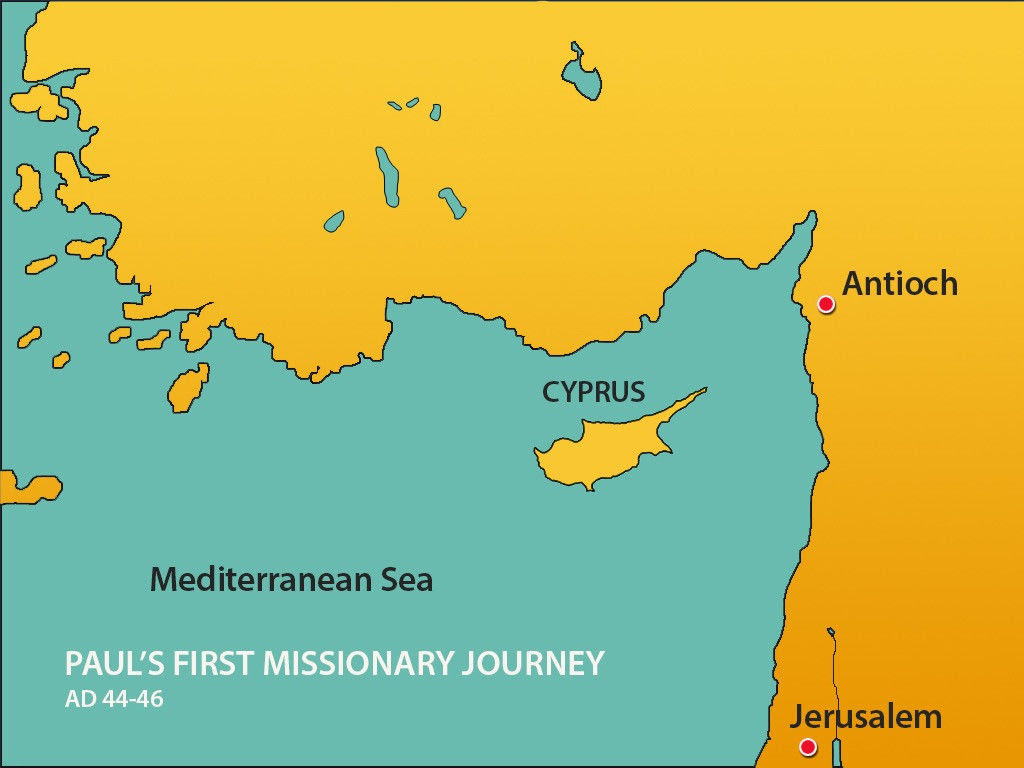| Acts 13: 1 – 4 Saul is called Paul for the first time in Acts 13. Does this reflect a continuing shift in his sense of personal identity as he more and more aligns with the Gentiles to whom he is increasingly committed? The church in Antioch, where Christians were first so called, has grown strong, as has its leadership, several of whom are named in this chapter. Simeon who was called Niger, may well have been called Niger because of African heritage; Manaen, a member of the court of Herod (Antipas) sports a Hellenized version of the Jewish name Menahem. This is a diverse group, and they commission Barnabas and Saul to carry the Good News well beyond Antioch. It is estimated Paul traveled over 10,000 miles in the course of his missionary journeys, and the first missionary journey starts here, as he and Barnabas head down to the coastal city of Seleucia from whence they sail for Cyprus. Christianity is an evangelical faith which, from the first, has actively sought for the conversion of others to God as revealed in Jesus Christ. This can be somewhat unsettling for sophisticated, inclusive, 21st century folk inclined to live and let live, and placing high value on individualism, personal choice, and respect for a variety of perspectives. Does embrace of Christian Faith mean one must deny that truth exists elsewhere in the prism of the world as the light of God refracts in many streams and colors? No, it does not. Those within the Christian fold who think Christianity must be presented as an absolutist and exclusive system are, in my view, quite mistaken. |

| I am reading C.S. Lewis’ ‘Mere Christianity’ with our aspirant to Holy Orders, Licenciado Miguel Rangel. That is to say I am reading the Spanish translation, ‘Mero Christianity’, having lost my English copy, and so think I am correctly translating Lewis when he says “Christians are free to think that all religions, including the strangest, contain at least a modicum of truth” (pg. 53). I would expand that point to say those who profess no faith whatever often have profound insight on the nature of reality and the contours of desirable human comportment. Anglicanism is an innately conciliatory strand of Christian Faith, perhaps because it emerged as a bridge Church holding together the ancient Catholic Faith and the critique of reformist Protestantism while restraining the extremist tendencies of 16th century religious fervor found in both. How we came to be the worlds’ third largest expression of Christianity after the Roman Catholic and the Orthodox Churches is something of a mystery, as we aren’t well-known for active proselytism. To be conciliatory, aware that God moves in the world well-beyond that which can be expressed in overly-restrictive religious dogma, is not to preference relativism. Anglicans believe God was conducting an upset, reconfiguration and revelation in Jesus that subversively continues. St. Paul’s missionary endeavor challenged societal structures, shop-worn racial, class and gender distinctions, and unleashed forces that reconfigured the lived reality of vast swaths of the earth’s peoples. We will be following this First Missionary Journey in the Book of Acts understanding that there is a Divine Truth, a plumb-line toward which we are all summoned, and that this will entail a series of conversions both small and great, personal and structural for all humanity, challenged beyond self-limiting prejudice. “The Truth will set you free,” said Jesus, which is, not incidentally, the motto of the Anglican Communion; and it is that freedom, not parochial exclusivism, on which the apostles find themselves in hot pursuit. Grace and peace, The Reverend Canon George F. Woodward III A PRAYER FOR HUMILITY Holy One, who sent your Son Jesus Christ, have mercy upon me. May I follow in his example, leading and loving in great humility, for you oppose the proud but raise up the lowly. Help me to be respectful and gracious in every interaction, patient, loving and kind. I would serve you, Lord, and follow in your way. Amen. Previous Reflections may be found on the parish website StPaulSMA.com under ‘Blogs’ here. YouTube postings are available here. Previous editions of THE EPISTLE can be found here. |

| St. Paul’s Anglican Church Calzada del Cardo, 6 Centro 37700, San Miguel de Allende, Mexico 415.121.3424 www.StPaulSMA.com |

